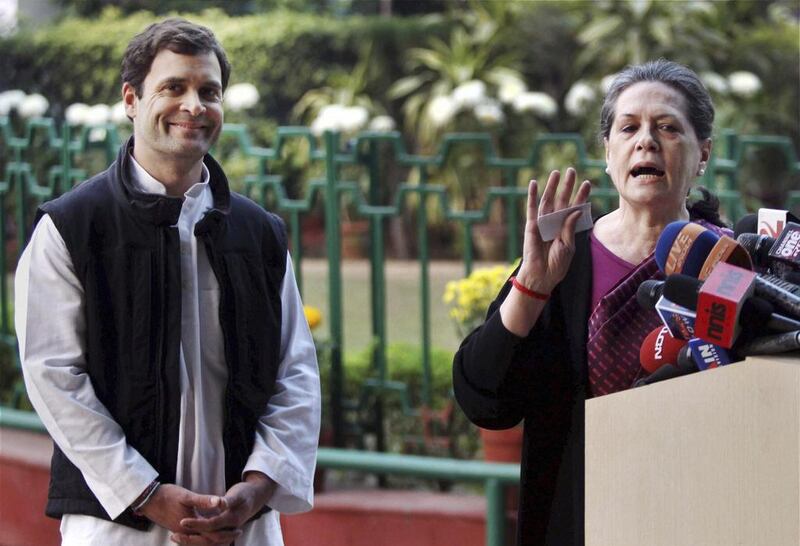NEW DELHI // Standing beside his mother at the headquarters of India’s ruling Congress party after getting thumped in state elections, Rahul Gandhi again promised to overhaul the country’s oldest political vehicle.
The 43-year-old heir to India’s most famous political dynasty has limited time to turn things around as the government’s popularity sags with national elections due by May. His party has won 12 of 29 regional polls since he became a prominent campaigner in 2009, raising doubts about whether he can replicate the success of his ancestors.
“He is going to face a serious problem within the party where people who think he is a liability will start working against him,” said AS Narang, a professor at Indira Gandhi National Open University who has been studying Indian politics for more than four decades. “They will probably lose next year’s elections, and then people may start questioning his direction openly.”
At stake is the role of a party in power since 2004 that’s poured money into programmes targeting the rural poor as the rupee’s slump to a record this year contributes to rising prices. The country’s benchmark stock index climbed to an all-time high yesterday after the opposition Bharatiya Janata Party won four state polls, giving it momentum to oust a government plagued by scandals that has overseen the slowest growth in a decade.
Frustration is showing among the eight coalition partners that joined with Congress to support the government of the prime minister, Manmohan Singh. The final test before the national vote saw the BJP win the most seats in four of five state polls held over the past month, including two where Congress held power.
Mr Gandhi “should look at what is failing, and he should fix it”, Tariq Anwar, a junior agriculture minister and a leader of the Nationalist Congress Party, Mr Singh’s largest ally in parliament, said on Monday. The outcome shows that “people want strong, firm and decisive leaders who can take bold steps and implement policies”.
Since he was first elected to parliament in 2004, Mr Gandhi has faced high expectations. His great-grandfather was Jawaharlal Nehru, India’s first prime minister and an independence hero. Indira Gandhi, his grandmother, led the country for more than 15 years before her assassination in 1984.
She was succeeded by Rajiv Gandhi, Rahul’s father, who lost power in 1989 and was killed by a suicide bomber two years later. Sonia Gandhi, Rahul’s mother, became president of the party in 1998, a post she still retains. Rahul took the vice president position in January.
In nearly a decade as a politician, Rahul has kept a low profile, giving fewer parliamentary speeches than other party leaders and declining Mr Singh’s requests to join the government. Instead he has worked to build the party’s ground organisation and introduced elections in its youth wing.
When put in charge of state campaigns, however, he has struggled to deliver.
Since 2009, when Mr Gandhi helped Congress win a second five-year term and started playing a larger role in campaigns, the party has lost 17 of 29 elections in states and union territories that account for most of the seats in parliament.
Last year, Mr Gandhi led Congress to defeat in elections in Uttar Pradesh, the country’s most-populous state, where the party won 7 per cent of seats in the 403-seat assembly. Afterward, he called the loss “a very good lesson”.
Twenty months later, with his mother by his side, Mr Gandhi again pledged to change the 128-year-old party. He said he’s privately been asking party workers to find ways to empower voters, and vowed to now make this the central goal of his leadership.
“The Congress party has the ability to transform itself,” Mr Gandhi said on Sunday, without providing details. “We are going to do a better job than everyone in the country and involve people in ways that you cannot even imagine now.”
Narendra Modi, the BJP prime minister candidate, has contrasted his childhood spent serving tea on the railways with Rahul Gandhi’s more privileged upbringing. At a campaign rally in September, Mr Modi urged voters to prevent the country from being “run on the whims of a prince”.
“The party as a whole takes responsibility,” said Meem Afzal, a spokesman for the Congress party. “It’s local issues that dominated the elections. We failed to deliver the right message on the ground.”
Mr Gandhi needs to show more determination to lead the party and include more advisers from regional areas to ward off growing resentment, said Sandeep Shastri, the pro-vice chancellor of Jain University in Bangalore, who helped conduct opinion polls during the state elections.
“Questions are being raised within the party in private circles about his capacity to lead,” Mr Shastri said. “Congress men and women are getting concerned about how you deal with a leadership that is not able to inspire confidence. Gandhi really needs to test his leadership and get into the rough and tumble of national politics.”
* Bloomberg





